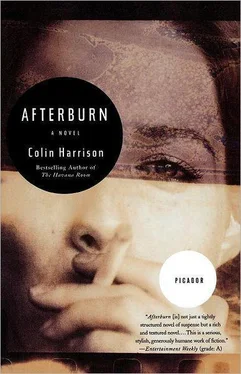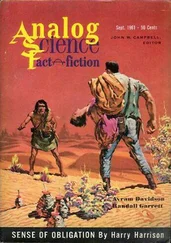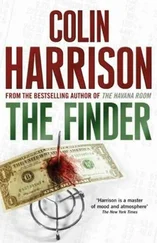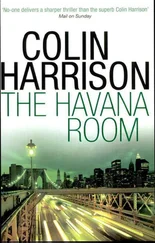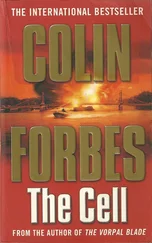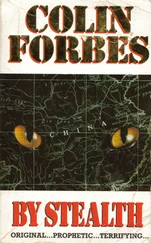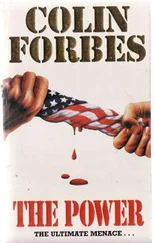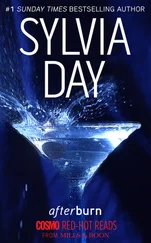Colin Harrison - Afterburn
Здесь есть возможность читать онлайн «Colin Harrison - Afterburn» весь текст электронной книги совершенно бесплатно (целиком полную версию без сокращений). В некоторых случаях можно слушать аудио, скачать через торрент в формате fb2 и присутствует краткое содержание. Жанр: Триллер, на английском языке. Описание произведения, (предисловие) а так же отзывы посетителей доступны на портале библиотеки ЛибКат.
- Название:Afterburn
- Автор:
- Жанр:
- Год:неизвестен
- ISBN:нет данных
- Рейтинг книги:3 / 5. Голосов: 1
-
Избранное:Добавить в избранное
- Отзывы:
-
Ваша оценка:
- 60
- 1
- 2
- 3
- 4
- 5
Afterburn: краткое содержание, описание и аннотация
Предлагаем к чтению аннотацию, описание, краткое содержание или предисловие (зависит от того, что написал сам автор книги «Afterburn»). Если вы не нашли необходимую информацию о книге — напишите в комментариях, мы постараемся отыскать её.
Afterburn — читать онлайн бесплатно полную книгу (весь текст) целиком
Ниже представлен текст книги, разбитый по страницам. Система сохранения места последней прочитанной страницы, позволяет с удобством читать онлайн бесплатно книгу «Afterburn», без необходимости каждый раз заново искать на чём Вы остановились. Поставьте закладку, и сможете в любой момент перейти на страницу, на которой закончили чтение.
Интервал:
Закладка:
But, Charlie wondered, perhaps he was wrong. He could think of one shape that money had not yet assumed, although quite a bit of it had been spent, perhaps a hundred thousand dollars in all. Money animated the dapper Chinese businessman across from him, but could it arrive in the world as Charlie's own grandchild? This was the question he feared most, this was the question that had eaten at him and at Ellie for years now, and which would soon be answered: In a few hours, Julia would tell them once and forever if she was capable of having a baby.
She had suffered through cycle upon cycle of disappointment-hundreds of shots of fertility drugs followed by the needle-recovery of the eggs, the inspection of the eggs, the selection of the eggs, the insemination of the eggs (recorded on videotape-another needle squirting into a dish), the implantation of the eggs (also recorded on tape with an ultrasound screen), the anticipation of the eggs. My eggs, my eggs — Julia's sad mantra. She'd been trying for seven years. The blockage of her fallopian tubes might be due, she'd said, to her use of an IUD years prior. Abortion, Charlie knew, could also cause the problem, but he'd never asked and his daughter had never told. Now Julia, a woman of only thirty-five, a little gray already salting her hair, was due to get the final word. At 11:00 a.m. Manhattan time, she'd sit in her law office and be told the results of this, the last in vitro attempt. Her ninth. Three more than the doctor preferred to do. Seven more than the insurance company would pay for. Almost as if she was trying for all of them, after what had happened to Ben, trying to bring new life to the family. Good news would be that one of the reinserted fertilized eggs had decided to cling to the wall of Julia's uterus. Bad news: There was no chance of conception; egg donorship or adoption must now be considered. And if that was the news, well then, that was really goddamn something. It would mean not just that his only daughter was heartbroken, but that, genetically speaking, he, Charlie Ravich, was finished, that his own fishy little spermatozoa-one of which, wiggling into Ellie's egg a generation prior, had become his daughter-had run aground, that he'd come to the end of the line; that, in a sense, he was already dead.
And now, as if mocking his very thoughts, came the fish, twenty pounds of it, head still on, its eyes cooked out and replaced with flowered radishes, its mouth agape in macabre broiled amusement. The chief waiter displayed the fish to the table, then whisked it away to a sideboard, where another waiter brandished gleaming instruments of dissection. Charlie looked at his plate. He always lost weight in China, undone by the soy and oils and crusted skin of birds, the rich liverish stink of turtle meat. All that duck tongue and pig ear and fish lip. Expensive as hell, every meal. And carrying with it the odor of doom.
Then the conversation turned, as it also did so often in Shanghai and Beijing, to the question of America's mistreatment of the Chinese. "What I do not understand are the American senators," Sir Henry Lai was saying in his softly refined voice. "They come over here and meet with us and say they understand that we only want for China to be China." Every syllable was flawless English, but of course Lai also spoke Mandarin, Cantonese, and a dialect spoken by his parents, who fled Shanghai in 1947 as the Communists approached. Sir Henry Lai was reported to be in serious talks with Gaming Technologies, the huge American gambling and hotel conglomerate that clutched big pieces of Las Vegas, the Mississippi casino towns, and Atlantic City. Did Sir Henry know when China would allow Western-style casinos to be built within its borders? Certainly he knew the right officials in Beijing, and perhaps this was reason enough that GT's stock price had ballooned up seventy percent in the last three months as Sir Henry's interest in the company had become known. Or was it that GT had developed an electronic version of mah-jongg, the betting game played by hundreds of millions of Chinese? Lai smiled benignly. Then frowned. "These senators say that all they want is for international trade to progress without interruption, and then they go back to Congress and raise their fists and call China all kinds of names. Is this not true?"
The others nodded sagely, apparently giving consideration, but not ignoring whatever delicacy remained pinched between their respective sets of lacquered chopsticks.
"Wait, I have an answer to that," announced the young fellow from Citigroup. "Mr. Lai, I trust we may speak frankly here. You need to remember that the American senators are full of-excuse my language-full of shit. When they're standing up on the Senate floor saying all of this stuff, this means nothing, absolutely nothing!"
"Ah, this is very difficult for the Chinese people to understand." Sir Henry scowled dramatically. "In China we believe our leaders. So we become scared when we see American senators complaining about China."
"You're being coy with us, Mr. Lai," interrupted Charlie, looking up with a smile, "for we-or some of us-know that you have visited the United States dozens and dozens of times and have met many U.S. senators personally." Not to mention a few Third World dictators. He paused, while amusement passed into Lai's dark eyes. "Nonetheless," Charlie continued, looking about the table, "for the others who perhaps have not enjoyed Mr. Lai's deep friendships with American politicians, I would have to say my colleague here is right. The speeches in the American Senate are pure grandstanding. They're made for the American public-"
"The bloodthirsty American public, you mean!" interrupted the Citigroup man, who, Charlie suddenly understood, had drunk too much. "Those old guys up there know most voters can't find China on a globe. That's no joke. It's shocking, the American ignorance of China."
"We shall have to educate your people," Sir Henry Lai offered diplomatically, apparently not wishing the stridency of the conversation to continue. He gave a polite, cold-blooded laugh and looked about the room. The laugh was repeated and the room relaxed.
"But it is, yes, my understanding that the Americans could sink the Chinese Navy in several days?" barked the German from Lufthansa.
The man should have known better. "That may be true," answered Charlie, "but it is also irrelevant. Sooner or later the American people are going to have to recognize the hemispheric primacy of China, and that-"
"Wait, wait!" Lai interrupted good-naturedly. "You agree with our German friend about the Chinese Navy?"
The question was a direct appeal to the nationalism of the other Chinese around the table.
"Can the U.S. Air Force destroy the Chinese Navy in a matter of days?" repeated Charlie. "Yes. Absolutely yes."
Sir Henry Lai smiled. "You are knowledgeable about these topics, Mr."-he glanced down at the business cards arrayed in front of his plate-"Mr. Ravich. Of the Teknetrix Corporation, I see. What do you know about war, Mr. Ravich?" he asked. "Please, tell me. I am curious."
The Chinese billionaire stared at him with eyebrows lifted, face a smug, florid mask, and if Charlie had been younger or genuinely insulted, he might have recalled aloud his years before becoming a businessman, but he understood that generally it was to one's advantage not to appear to have an advantage. And anyway, the conversation was merely a form of sport: Lai didn't give a good goddamn about the Chinese Navy, which he probably despised; what he cared about was whether or not he should soon spend eight hundred million dollars on GT stock-play the corporation that played the players.
But Lai pressed. "What do you know about this?"
"Just what I read in the papers," Charlie replied with humility.
"See? There! I tell you!" Lai eased back in his silk suit, smiling at the other men, running a fat little palm over his thinning hair. "He has no direct knowledge! This is a very dangerous problem, my friends. People say many things about China and America, but they have no direct knowledge, no real-"
Читать дальшеИнтервал:
Закладка:
Похожие книги на «Afterburn»
Представляем Вашему вниманию похожие книги на «Afterburn» списком для выбора. Мы отобрали схожую по названию и смыслу литературу в надежде предоставить читателям больше вариантов отыскать новые, интересные, ещё непрочитанные произведения.
Обсуждение, отзывы о книге «Afterburn» и просто собственные мнения читателей. Оставьте ваши комментарии, напишите, что Вы думаете о произведении, его смысле или главных героях. Укажите что конкретно понравилось, а что нет, и почему Вы так считаете.
